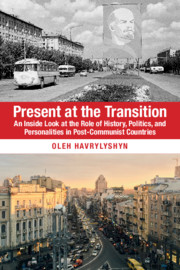 Present at the Transition
Present at the Transition Book contents
- Present at the Transition
- Present at the Transition
- Copyright page
- Dedication
- Contents
- Figures
- Tables
- Preface
- Acknowledgments
- Abbreviations
- Introduction
- Part I The Diverse Paths Taken in Transition
- Part II Choice of Strategy
- Part III Domestic Vested Interests and Reforms
- 7 The Old Guard
- 8 Formation of the Oligarchs
- 9 Corruption
- 10 Role of the Old Imperial Center
- Part IV Outcomes and Prospects
- Bibliography
- Index
10 - Role of the Old Imperial Center
The New Russia
from Part III - Domestic Vested Interests and Reforms
Published online by Cambridge University Press: 04 May 2020
- Present at the Transition
- Present at the Transition
- Copyright page
- Dedication
- Contents
- Figures
- Tables
- Preface
- Acknowledgments
- Abbreviations
- Introduction
- Part I The Diverse Paths Taken in Transition
- Part II Choice of Strategy
- Part III Domestic Vested Interests and Reforms
- 7 The Old Guard
- 8 Formation of the Oligarchs
- 9 Corruption
- 10 Role of the Old Imperial Center
- Part IV Outcomes and Prospects
- Bibliography
- Index
Summary
When the USSR dissolved and Russia became a new independent country, it “lost’ its empire of centuries and its identity as the central dominant core of that empire. A few leaders and intellectuals promoted the development of a New Russia – democratic and globally oriented – but many retained the imperialist ambitions, requiring rebuilding of the empire in a new form. This view in the end won the day, especially under President Putin since 2000, although it did not mean “Back to the USSR” (pace Beatles), rather the use of diplomatic, economic, and in the last resort military instruments to maintain dominance over its old sphere of influence – the “near-abroad” in Moscow’s terminology. Its near monopoly over energy supplies and transport routes in the region was the most powerful tool, but softer efforts to propose new forms of united cooperation on economic and military fronts were also important – the Eurasian Economic Union was offered as an alternative to the EU. The invasions of Georgia then Ukraine’s Crimea and Donbas gave mixed results as it encourage these two to move Westward even faster.
- Type
- Chapter
- Information
- Present at the TransitionAn Inside Look at the Role of History, Politics, and Personalities in Post-Communist Countries, pp. 242 - 268Publisher: Cambridge University PressPrint publication year: 2020
